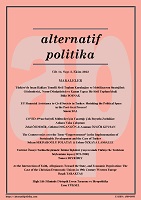EU FINANCIAL ASSISTANCE TO CIVIL SOCIETY IN TURKEY: SHRINKING THE POLITICAL SPACE IN THE POST-GEZI PROCESS?
EU FINANCIAL ASSISTANCE TO CIVIL SOCIETY IN TURKEY: SHRINKING THE POLITICAL SPACE IN THE POST-GEZI PROCESS?
Author(s): Sinem BalSubject(s): Civil Society, International relations/trade, Politics and society, EU-Accession / EU-DEvelopment, Sociology of Politics
Published by: Rasim Özgür DÖNMEZ
Keywords: EU Funds; Civil Society; EU-Turkey Relations; Gezi Protests; Gramsci;
Summary/Abstract: This study investigates the EU’s stance on post-Gezi civic engagement, which is based on alternative alliances and against the anti-democratic extremes of state power. Using a Gramscian perspective, the paper underlines the fact that before the protests, Turkey’s civil society had been politically socialized by the help of EU financial assistance as a sign of an ideology of consent. That is, the EU has focused on liberal-democratic cooperation with civic organic intellectuals, based on the conviction that civil society is the engine for social and political transformation. However, even though civil society organizations have strengthened their catalysing role and become a new counter-hegemonic political space since the Gezi protests, it is argued that Turkey’s normative distance from the EU and the pragmatic links between the EU and Turkey over refugees have led the EU to reduce its financial relationships with Turkey’s rights-based civil society.
Journal: Alternatif Politika
- Issue Year: 14/2022
- Issue No: 3
- Page Range: 486-518
- Page Count: 33
- Language: English

